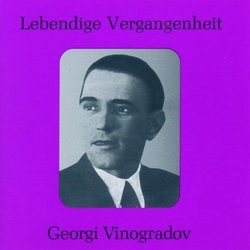| All Artists: Robert Schumann, Nikolai Rimsky-Korsakov, Anton Rubinstein, Pyotr Il'yich Tchaikovsky, Sergey Rachmaninov, Georgei Vinogradov Title: Lebendige Vergangenheit: Georgi Vinogradov Members Wishing: 0 Total Copies: 0 Label: Preiser Records Release Date: 2/20/1996 Genres: Pop, Classical Styles: Vocal Pop, Opera & Classical Vocal, Historical Periods, Modern, 20th, & 21st Century Number of Discs: 1 SwapaCD Credits: 1 UPC: 717281891189 |
Search - Robert Schumann, Nikolai Rimsky-Korsakov, Anton Rubinstein :: Lebendige Vergangenheit: Georgi Vinogradov
 | Robert Schumann, Nikolai Rimsky-Korsakov, Anton Rubinstein Lebendige Vergangenheit: Georgi Vinogradov Genres: Pop, Classical
|
Larger Image |
CD DetailsSimilar CDs |
CD ReviewsThe most beautiful Russian tenor? Ralph Moore | Bishop's Stortford, UK | 07/13/2010 (5 out of 5 stars) "I am indebted to fellow Amazon reviewer Philip Griffey for introducing me to this wonderful singer. As someone who thinks of himself as reasonably well informed regarding recorded voices, I suppose it is indicative of his lack of profile that I had not registered his importance - yet after a little reflection I remembered that he features on just one track in Volume Four of the EMI Record of Singing 7 disc set, singing in 1948 a haunting Mussorgsky aria "Why, my sad heart" from "Sorochintsy Fair" (which, incidentally, contains a plaintive little bassoon riff which Stravinsky clearly stole for the opening phrases of "The Rite of Spring"). Somehow I had overlooked him, yet listening to this piece, I am clear that this a special voice; a lovely, typically plangent Russian tenor, very much like Lemeshev and Kozlovsky, and in the Smirnov-Sobinov tradition.
There are two oddities about his career: first, he was exclusively a radio singer and never appeared on the operatic stage. He was famous not only for singing not only classical repertoire but also light, popular songs and jazz. He did much to rehabilitate the traditional Russian song and sang just a few operatic roles for lyric tenor - to perfection, if his celebrated account of "Adieu Mignon" is typical. You will not find that recording on this disc and to hear it, you will need to invest in the 4 disc Guild issue so expertly reviewed by my colleagues on MusicWeb. The second oddity is that having received many honours, some misdemeanour in 1951 - supposedly a brawl with some Polish officers which embarrassed the government - caused him to be be dropped by the authorities and he became virtually a non-person, singing and teaching until the mid-60's but ignored by the establishment. Nonetheless, here is a kind of perfection of voice: exquisite sweetness without effeminacy, superb legato, effortless breath control, breadth of phrasing and mastery over both mezza-voce and the messa di voce. The bulk of this disc is taken up by Schumann Lieder, chiefly "Dichterliebe" - and the apparent disadvantage of its being sung in Russian does not prevent me from placing Vinogradov's interpretation at the very top of my list of preferred versions; his depth of feeling and expression transcend even my virtually non-existent Russian. His perfect diction allows the poetry of the words to emerge and even I understand the odd phrase by recalling the German or recognising " ya lyublu tebya". Nor is his voice without steel when that is required; in addition to the range of gentler, more melancholy emotions evinced in his performances of the songs by various Russian composers which conclude this recital, his voice rings out powerfully in the climax of Tchaikovsky's "Der Asra" and Apukhtin's "To forget so soon". I obviously do not know how big the voice was in person, beyond the medium of the microphone, but it sounds as if it was resonant and penetrating. The pianist is clearly a sensitive and very competent musician, and the the fact that these recordings are mono did not even occur to me while I was listening to them, so absorbed was I by the artistry of singer and accompanist. I hope that wider acquaintance by others with Vinogradov's recorded legacy will permit many more to share the revelation that his voice was to me." |

 Track Listings (27) - Disc #1
Track Listings (27) - Disc #1
